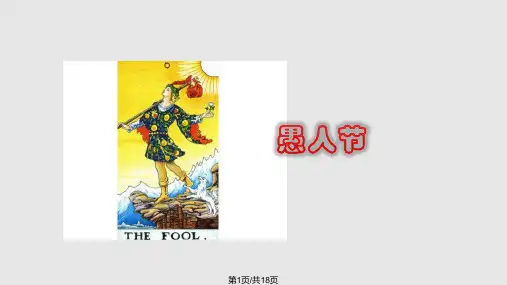• 十六世纪的法国,人们在4月1日这天过 新 年,互赠礼物,举办晚会,庆祝新年。
origin • In 1582 the French king Charlie IX decided to adopt a new calendar - Craig Gregory calendar, New Year's day to change in January 1st. In the process of new calendar , some people were not willing to accept the new calendar, or didn't know the date changes, still celebrated the new year on April 1 .
愚弄,日久天长,便成为流行的风俗。
celebration • Now this festival also began in China, especially among the college students.
现在这一节日也开始在我 们中国流行,尤其是在大学生 中间。由此看来,愚人节不仅仅是西 方人的事情,也影 响到东方。
• 愚人节又称万愚节,已经有几百年的历 史了。 关于他的起源,众说纷云。其中 最为流行的说 法认为愚人节起源于法国。
• In the sixteenth-century France, on April 1, people celebrated New Year's day, exchanging gifts, having a party and so on.
• On that day, people often organize
family reunions, the rooms are decorated with daffodils and daisy .愚人









